Library
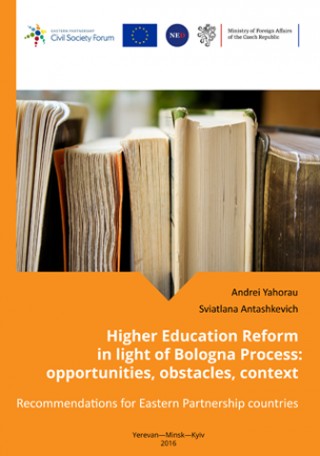 Higher Education Reform in light of Bologna Process: opportunities, obstacles, context. Recommendations for Eastern Partnership countries
Higher Education Reform in light of Bologna Process: opportunities, obstacles, context. Recommendations for Eastern Partnership countries
Andrei Yahorau, Sviatlana Antashkevich
In 2016 Eastern Partnership Civil Society Forum supported the project “Higher Education Reforms Reinforcement in Eastern Partnership countries” that was implemented by the group of civil society organizations from Armenia, Belarus and Ukraine. Here present meaningful project’s results including some recommendations.
Download book
 Belarus in the region of the Eastern Partnership countries (1992-2012). Interstate relations strategy. Political and economic role in the region.
Belarus in the region of the Eastern Partnership countries (1992-2012). Interstate relations strategy. Political and economic role in the region.
Andrei Kazakevich, Andrei Valodzkin, Aliaksandr Filipau
In 2008, within the framework of the Eastern dimension of the European Neighborhood Policy, the European Union initiated the launch of a program of rapprochement and profound cooperation with six post-Soviet countries — “new eastern neighbors” — Azerbaijan, Armenia, Belarus, Georgia, Moldova, and Ukraine. In May 2009, these countries accepted the EU proposal to become participants of an initiative which received the name Eastern Partnership. In addition to the development of mutual relations between the EU and each partner country, this initiative also presupposed the development of multilateral relations between all participants of the Eastern Partnership. In order to determine the place and role of Belarus in mutual relations (first of all, at political and economic levels) with the countries which now are part of the Eastern Partnership region, to describe the way these mutual relations have been developing during two decades (1992-2012), and to reveal the potential of further regional cooperation, in 2013 the Political Sphere Institute of Political Studies carried out a research with results are presented here.
The research was carried out with the support of the Center for European Transformation.
Download book
 Belarusan-European relations: a history of unseized opportunities
Belarusan-European relations: a history of unseized opportunities
Andrei Yahorau, Alena Zuikova
The book presents an analysis of the relations of Belarus and the European Union since 1991 up to the present day. The authors scrutinize the problems of Belarus’ geopolitical choice, the changes of the foreign policy doctrines of independent Belarus, the historical development of European-Belarusan political interactions, their actual condition, and build the foundations and frameworks to program the European vector in Belarus’ politics. The basis of a new construct of the foreign policy is the proactive approach that makes it possible to raise the questions about Belarus as about a European problem, to revise the policy of the European Union with a view to Belarus’ development, to seek for the ways of influencing the EU eastern policy and to change it in the necessary direction, and to use the current European initiatives and programs in the national interests.
The book is designed both for specialists in the field of the Belarusan foreign policy and international relations and for a wide audience interested in the questions of the Europeanization of Belarus.
Download book
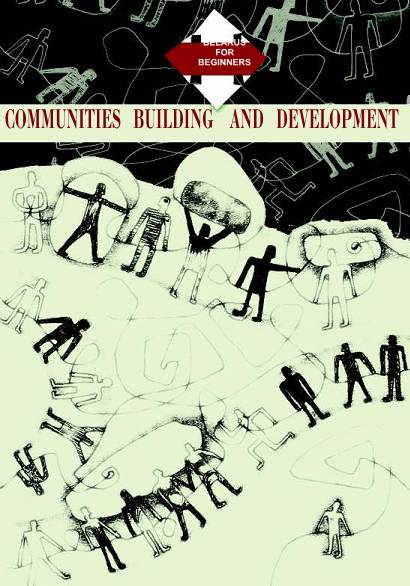 Communities Building and Development
Communities Building and Development
Tatiana Vadalazhskaya, Uladzimir Matskevich
The present brochure contains concise analysis of what hampers the emergence and development of communities in Belarus and presents the principles and foundation of our own activity. It only claims to provide arguments for right and more accurate planning of time, resources, and human effort while working on community development in Belarus.
Authors draw extra arguments and certainty from the fact that in addition to judging about the development of communities as experts we ourselves, as representatives of a dynamically developing community, have our own experience of life and activity in a society, an experience of surviving under Belarusian conditions.
Download book
 Contemporary History in Faces
Contemporary History in Faces
Aliaksandr Tamkovich
The book contains political essays about people who are well known in Belarus and abroad and who had the most direct relevance to the contemporary history of Belarus over the last 15 to 20 years. The author not only recalls some biographical data but also analyses the role of each of them in the development of Belarus.
And there is another very important point. The articles collected in this book were written at different times, so today some changes can be introduced to dates, facts and opinions but the author did not do this INTENTIONALLY. People are not less interested in what we thought yesterday than in what we think today.
Download book
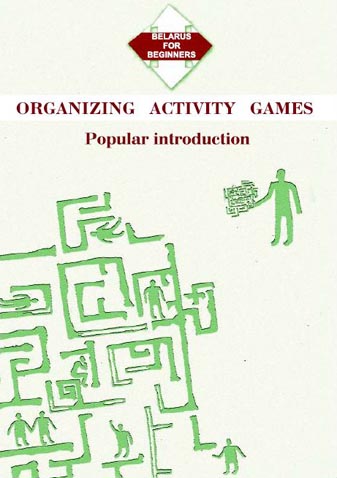 Organizing activity games: Popular Introduction
Organizing activity games: Popular Introduction
Andrei Yahorau, Tatiana Vadalazhskaya
Today’s Belarus can be considered a challenge, a highly difficult complex of tasks and problems for all who see themselves in an active, deedful position in respect of the socio historical situation. Our time and our situation are characterized, on the one hand, by the scale and diversity of changes and, on the other hand, by the novelty of problems faced by an individual, Belarusan society and even mankind as a whole. This novelty of tasks necessitates adequate means, ways, instruments and methods of work. Among such means and methods, the Humanitarian Techniques Agency (HTА) and the Center for Social Innovations (CSI) apply more and more the organizing activity games (OAGs).
Download book
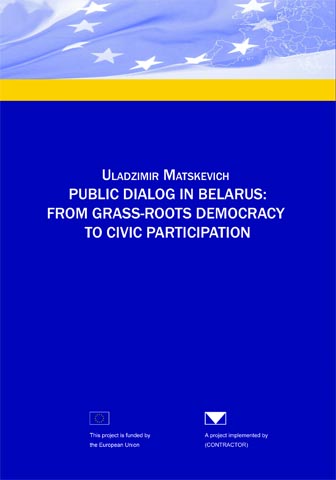 Public dialog in Belarus: from grass-roots democracy to civic participation
Public dialog in Belarus: from grass-roots democracy to civic participation
Uladzimir Matskevich
The book continues the “Belarus for Beginners” series and deals with the problem of organizing political dialog in Belarus. The book studies successively a number of questions which lie in the foundation of this problem: from the differentiation of the notions “people” and “society” — to the specificity of public communication and dialog organization principles. Much attention is given to the analysis of the Belarusan forms and precedents of the solution of this problem. As an annex to this book, there is Olga Smolyanko’s analytical material on the legal regulation of the activity of public advisory councils in Belarus.
The book is aimed at setting a reflective and reasonable attitude to the organization of public dialog in Belarus, suggesting notions, categories, and schemes for an activity attitude to this process. The book is intended for public, cultural, and political figures, as well as everybody who is interested in the adequate understanding of the processes that take place in Belarusan society.
Download book
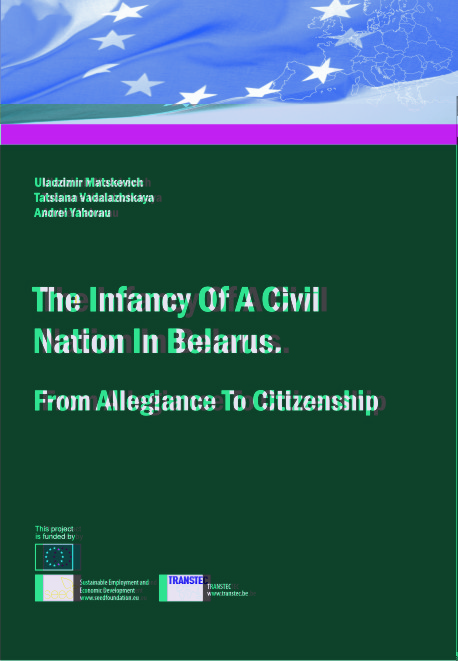 The Infancy of a Civil Nation in Belarus. From Allegiance To Citizenship
The Infancy of a Civil Nation in Belarus. From Allegiance To Citizenship
Uladzimir Matskevich, Tatiana Vadalazhskaya, Andrei Yahorau
In the modern scientific and pseudoscientific humanities concerning Belarus, the topic of national and civil relations, the national and civil identity, perhaps heads the list. Almost all authors have touched this theme. Such close attention can be explained by the fact that the key to the Belarusan nation’s mystery can reveal the ways to understand and overcome the national history’s dramas and tragedies, and to explain today’s events and contradictions. Even though it may look like significant exaggeration, nevertheless it is close to the root of the matter. Of course, it is not the only form in which Belarus can and must be perceived, but without the understanding of the national and civil construction processes’ history and modernity, it is very difficult to comprehend the country’s current situation.
Download book
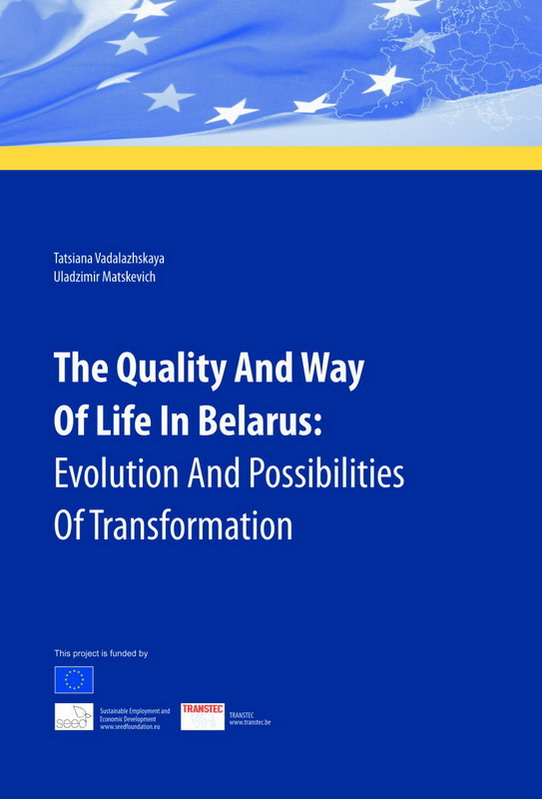 The Quality and Way of Life in Belarus: Evolution and Possibilities of Transformation
The Quality and Way of Life in Belarus: Evolution and Possibilities of Transformation
Tatiana Vadalazhskaya, Uladzimir Matskevich
In this work, we consider the lifeway sphere to be changing — from generation to generation, or even during a period comparable with human life. Moreover, we believe that in the lifeway sphere it is possible and even necessary to have changes or reforms with apt concepts, notions, programmes and political will in order to implement them.
In the first part of this book, we describe how the tenor and way of life changed in Belarus during the second half of the 20 century when the USSR existed. In the same part, we characterize the latest decades’ policy and state programmes. We proceed from the assumption that the Belarusan authorities’ actions were based on the concepts, notions and categories suggested by public and human sciences. The Belarusan regime has been carrying out purposefully and consistently the programme built on the basis of the Soviet ideology and social science.
In order to develop new programmes and to start launching reforms corresponding to modern global tendencies, thus including Belarus in the fullfledged allEuropean process, it is necessary to change the conceptual bases of humanitarian and social approaches, concepts and categories. Therefore, in the second part, we review possibilities and ways of constructing such concepts and categories which would make it possible to implement reforms in the lifeway sphere.
Download book






















